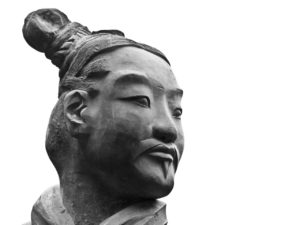
The Australian government has done a tremendous job in playing off both sides of the emerging US-China cold war.
In a move Sun Tzu would have approved of, Australia has nimbly adopted the “bird in hand is worth beating around the bush” strategy…. that I coincidentally suggested soon after Prime Minister Morrison took office (see my speech of 22 October 2018).
The bird in hand is Australia’s economic gains from China, while ‘beating around the bush’ on national security issues has meant neither the US nor China have been able to force Australia to ‘choose a side’.
Pretend to be confused when you have clarity; show weakness when you have strength
In a masterful tactic worthy of Machiavelli, the constant barrage of contradictory comments from parliamentary front and back benchers, about how Australia views China and US, have left both elephants in the room punch drunk and confused about Australia’s position.
This confusion has kept the status quo, enabling Australia to reap the export and business benefits from China, while remaining under the protective wings of the American eagle.
Additionally, the clever use of seven Prime Ministers over the past 11 years has created a revolving leadership target that no superpower has been able to pin down.
Political science students for generations to come, will be in awe of how a middle power could successfully duck and weave amongst rival superpowers for so long.
But one day, the elephants will see through Australia’s ruse.
What then?
I suspect the Australian government will double up on its strategy. Hit them harder with contradictions wrapped in enigmas, clouded by half-truths, riddled with paradoxes.
Here is one possibility.
- US military bases in Darwin? Just chill, Mr Xi and Mr Trump…Australia is merely exploring the Djibouti rent-a-base service model.
- China has a built its first offshore military base in Djibouti, as many ‘experts’ like to point out.
- But the USA, Italy, Japan and France have had bases in Djibouti for years, just a few soccer-ball kicks from China’s. The French have even sub-leased part of its military base to the Germans and Spanish.
- Australia might adopt the WeWork model for military bases…shared gun emplacements, radar equipment and missile silos for a host of countries wanting to share space in a warm and collegial environment.
- As WeWork says “We wanted to build a community. A place you join as an individual, ‘me’, but where you become part of a greater ‘we’. A place where we’re redefining success measured by personal fulfillment, not just the bottom line. Community is our catalyst.”
- Thank you WeWork….you may have saved the world, before you even IPO’ed.
With Australia’s geopolitical savviness to the rescue, Australian exports, business and investments can continue.
Make hay while the sun shines…as dark clouds are forming …
- Economic eggs in the China basket
- Dropping the basket – when and why
- Oops there were no weapons of mass destruction…why national security assessments and ‘think tanks’ needs an independent ‘audit’
- Warlords, dissidents and democracy in China – HK crisis as a case in point
- China’s modern psyche….impact on national security assessment
Almost all our economic eggs are in the China basket. There is no replacement basket. Japan, India, SE Asia, Europe, North America do not need our goods and services as much as China does.
China is the goose producing our golden eggs. And I mean goose in a nice way. Dropping this China basket for ‘national security assessments’ at this point in time is a wasted opportunity to make the hay while the sun shines.
More clarity, even an independent ‘audit’ on the accuracy of national security risks needs to be carried out. It would be a shame if another “oops, there were no weapons of mass destruction” (ala Iraq War, despite the ‘best’ efforts of US and allied intelligence assessments) was discovered after/if the goose was cooked. And I mean ‘best’ efforts in a nice way.
To be fair, most risk analysts would prefer to err on the side of caution….ie better a devil we know (USA) than a devil we don’t (China).
But as the American author Stephen Covey wrote… Seek first to understand, then to be understood.
One example of mistaken information is the frequent description of Xi Jinping as a “princeling” and the glossing over his formative years, from aged 10 to his early 20s as he and his family were purged by the CPC. If one gets this wrong, what else is wrong in these risk assessments?
My article on warlords, dissidents and democracy in China (written in Sep 2016 and still pertinent) and my article on China’s modern psyche (written in Oct 2015) could help in better understanding.
My next newsletter will be on specific opportunities for Australian businesses and investment in this new geopolitical environment. Please subscribe to my free newsletters on the button below.
